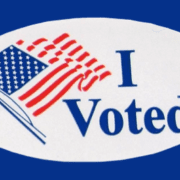Absentee By-Mail Voting Begins Monday for NC Primary Election
THIS STORY IS PRESENTED IN PART BY DRAKE DENTISTRY
-Press Release, NC State Board of Elections
Beginning Monday, January 13, 2020, absentee by-mail ballots for the March primary election will be mailed to voters who request them. Any registered voter in North Carolina may vote absentee by-mail.
Primary Election Day – when voters select the political party nominees to appear on the ballot in the November 3 general election – is March 3, 2020.
“By-mail absentee voting officially launches the 2020 primary election,” said Karen Brinson Bell, executive director of the State Board of Elections. “Any registered voter in North Carolina may request a mail-in absentee ballot for the primary.”
To vote absentee by-mail, voters must complete a 2020 State Absentee Ballot Request Form. For the 2020 primary, the form must be received by the voter’s county board of elections by 5 p.m. Tuesday, February 25, 2020.
Voters who submit a valid request will receive a ballot from their county board of elections. The materials will include detailed instructions on how to complete and return the ballot.
For a one-page guide on how to vote absentee by-mail, go here.
Session Law 2019-239 made several changes to the absentee voting process. Changes include:
- An absentee request form is now valid only if returned to the county board of elections by the voter, the voter’s near relative or legal guardian, or a Multipartisan Assistance Team (MAT);
- The absentee request form must be mailed or delivered in-person to the voter’s county board of elections. Unlike past elections, request forms may not be emailed or faxed; and
- If a voter needs help completing the request form due to blindness, disability, or inability to read or write, and a near relative or legal guardian is not available, the voter may get help from another person, who must list their name and address on the form.
About the Primary Election
All five recognized political parties in North Carolina – Constitution, Democratic, Green, Libertarian and Republican – have primary ballots. Voters affiliated with a political party may only vote in their party’s primary. (For example, a voter registered as a Democrat may only vote the Democratic primary ballot.)
Unaffiliated voters may choose either the Democratic, Libertarian or Republican ballot, or a nonpartisan ballot, if available.
The one-stop, in-person early voting period for the March 3 primary begins Thursday, February 13 and ends Saturday, February 29.
Uniformed or Overseas Citizens
Uniformed service members, as well as U.S. citizens living outside of the country, may request absentee ballots under the Uniformed and Overseas Citizens Absentee Voting Act (UOCAVA). For more information about UOCAVA absentee voting, visit FVAP.gov or ncsbe.gov/voting-options/military-overseas-voting.
Multipartisan Assistance Teams (MATs)
Special assistance is available for voters living in care facilities, such as nursing homes. Upon request, county boards of elections will send a Multi-partisan Assistance Team (MAT) to help voters in facilities complete their 2020 State Absentee Ballot Request Form, mark their ballot, or serve as required witnesses.
Care facility coordinators or members of the public can contact their local county board of elections office to schedule a visit.
For more information about absentee voting, visit ncsbe.gov/voting-options/absentee-voting.

